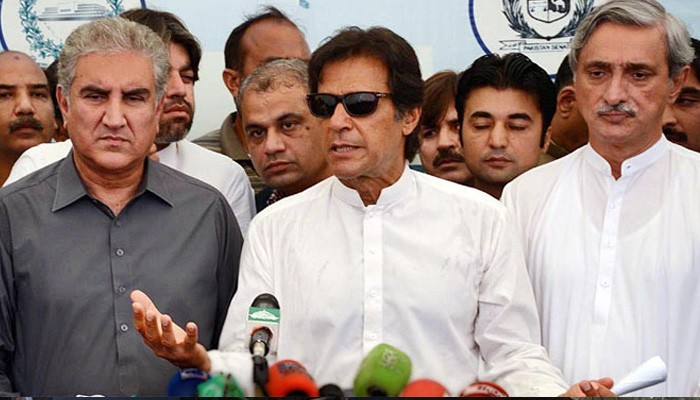
The federal cabinet reshuffle has exposed the Pakistan Tehreek-e-Insaf (PTI) government and cracks within the party

Prime Minister Imran Khan told his party’s senior member, Asad Umar, to step down as finance minister and, instead, hold the charge of minister for energy, which he refused to accept, staying away from the federal cabinet in protest.
The PTI has been facing serious challenges in the past nine months to set a direction of the economy. The party’s policy makers came up with nothing but poor governance, particularly in the Punjab province where the party also seems divided over its choice of the chief minister.
PTI’s coalition government, having a very thin majority in the National Assembly and Punjab, is in hot waters for its talks with the International Monitory Fund (IMF) to finalise the bail-out package.
"The Prime Minister called me and told me that I should hold the charge of the energy ministry because there is lot of pressure of the opposition and criticism from different quarters to deliver and correct the things quickly but this was not an easy task indeed," Asad Umar told a press conference soon after leaving the charge of finance ministry. He seemed disappointed over the way the PM had succumbed to the external pressure.
On the other hand, the opposition parties celebrated this political shake-up within the PTI, urging the whole government to admit its incapability and inefficiency. Celebrating the reshuffle in the federal cabinet, Bilawal Bhutto Zardari, Chairman Pakistan People’s Party, hoped the decision would have a positive impact on the economy. "It took eight months for the PTI government to admit that economic policies are flawed."
The PPP has been urging the PTI government to remove its three federal ministers for their alleged links to the banned outfits, which included Asad Umar.
"The PTI has not been able to handle two key issues -- governance and economy. In Punjab, they have a very ineffective and unimpressive chief minister to deliver on governance," says Zahid Hussain, senior political analyst. "However, the opposition is not posing a serious challenge to the government yet the ruling party is getting exposed because of its inconsistent behaviour." At the moment, the opposition is fragmented and under pressure already. It cannot bring people out in streets at the moment, he adds.
Hussain says the plus point for the PTI government is that the military establishment is fully behind the government. "They may not be happy the way the economy is being run and the way matters are being dealt with in Punjab but they will try to make things change as per their aspirations." The whole political survival of the PTI government is in how they handle economy and Punjab province.
Since coming to power, the PTI government has been claiming that it would transform the institutions and reform the governance system in Pakistan. However, it could not come up with clear policies in the last eight months, except tall claims and verbal assurances.
The reforms agenda proved to be an uphill task amid the political uncertainty and economic crisis. In the recent weeks, PTI has been avoiding to convene the National Assembly session to avoid the opposition as the PM did not like to face opposition parties’ hooting and political slogans.
"This is the beginning of the end because there are no two opinions that those who have orchestrated this script knew exactly what they were doing. They knew that PTI is not a political party with any narrative," says Wajahat Masood, a senior political analyst.
"These failures and the coming ones will not be a surprise. Their expectations to magically make the already collapsing economy better are illogical. They want to milk the mule." Masood feels such reshuffles are just scapegoats to make way for some other system which is under discussion these days.
Amid government failures, a presidential form of government is also under discussion allegedly to wrap-up parliamentary rule. However, this system needs a two-thirds majority in the parliament for a constitutional amendment, which the ruling PTI cannot think of without having full consent of the opposition parties.
Hussain thinks the idea of presidential system is being floated within the PTI and the establishment. They say the parliamentary system cannot deliver or has failed to deliver. "However, I think it’s a futile debate because changing a system needs a big majority and a political environment in the country," he maintains.
Amid the government’s failures, opposition parties’ top leadership is facing cases of corruption in the National Accountability Bureau (NAB).
Opposition parties are threatening to start anti-government movement for which they are mainly relying on the street power of religious parties in the opposition, mainly Jamiat Ulema-i-Islam led by Maulana Fazlur Rehman, who wants to have a prolonged sit-in in Islamabad to oust the government.
Also read: At the centre of power struggle
However, Masood thinks that opposition parties are already weak and they are just watching the situation keenly so that the PTI government is exposed.
In Punjab, where the government already has a thin majority, Chief Minister Usman Buzdar is under criticism because of his poor performance and inability to handle the largest province -- a stronghold of PML-N.
Political analysts believe if the PTI cannot come out of current turmoil and fails to bring positive changes after this cabinet reshuffle, there will be more scapegoats in the coming days, mainly in Punjab.